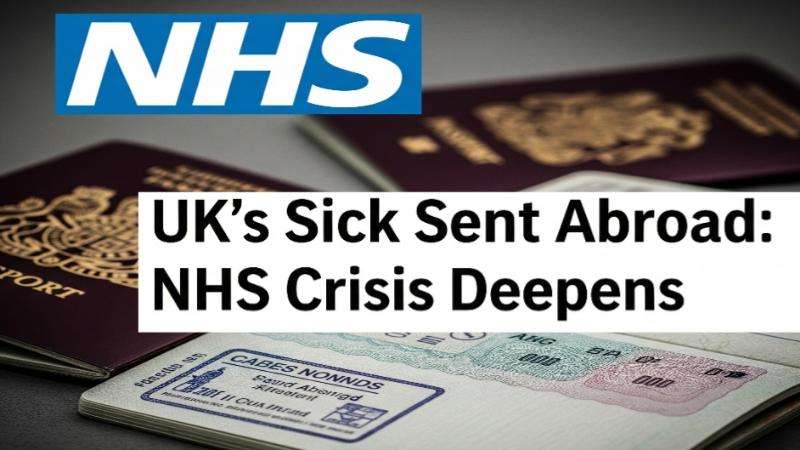Record backlog forces NHS to fund treatments in Europe, costing millions and raising concerns about inequality.
The National Health Service (NHS) is increasingly resorting to sending British patients abroad for medical treatment as domestic waiting lists in England reach unprecedented levels. This alarming trend sees the NHS footing the bill for procedures in various European countries, including Poland, Lithuania, and the Czech Republic, prompting widespread concern about the state of the UK's healthcare system, Daily Dazzling Dawn understands.
Treatments being undertaken overseas span a wide range, from common operations like hip replacements and cataract surgeries to more intricate cancer procedures. The number of patients receiving such care abroad has surged by a staggering 42% in just two years, highlighting the escalating pressure on the NHS.
The Health Secretary has condemned the situation as "unacceptable," attributing it to a "broken NHS" that has left patients facing "far too long for treatment, forcing many to go private or even seek healthcare abroad."
Millions Spent on Overseas Care
Newly revealed figures shed light on the significant financial outlay by the NHS for these overseas treatments. Data recorded by the NHS and converted to pound sterling show substantial sums allocated to different countries:
Germany: Over £147,000 on treatments.
Poland: Over £138,000 on treatments.
Switzerland: Over £138,000 on treatments.
Italy: Over £134,000 on treatments.
Austria: Over £134,000 on treatments.
While these figures represent treatment costs, they do not explicitly detail additional expenses such as patient travel, accommodation, and the costs for any accompanying family members or escorts. However, under the Healthcare Travel Costs Scheme (HTCS), patients who qualify for certain benefits may be able to claim a refund for reasonable travel costs within Great Britain to their departure point for international travel. The actual cost of the international journey and accommodation abroad is typically agreed upon by the health service body arranging the overseas treatment, alongside the necessity of a companion.
The surge in overseas approvals is further illustrated by NHS England figures revealing that nearly two out of every five applications (37%) made by patients seeking treatment abroad were approved in 2024, a notable increase from just one in five (21%) in 2022. This suggests a growing number of cases are meeting the criteria for "undue delay" within the UK.
A "Terrible Indictment" and Deepening Inequalities
Experts are describing the rising reliance on overseas treatment as a "terrible indictment" of the NHS's current condition. Rachel Power, chief executive of The Patients Association, stated that when patients feel compelled to seek treatment abroad, it is "a reflection of the state of the waiting lists and the very severe problems of the NHS."
A significant concern raised by Mrs. Power and others is the potential for this system to exacerbate existing "inequalities." The application process for overseas treatment, along with the necessity to navigate travel and accommodation arrangements, can present substantial barriers for vulnerable patients or those lacking the confidence and means to manage such complexities. This could inadvertently create a two-tier system, where only those with the resources and ability to navigate the bureaucracy can access quicker treatment.
Professor Ranee Thakar, president of the Royal College of Obstetricians and Gynaecologists, underscored the urgency, stating that patients travelling long distances for care is "clear evidence that they can’t access the care they need, when they need it." She highlighted the particular crisis in gynaecology, with over three-quarters of a million women in the UK awaiting hospital care for conditions that severely impact their lives.
These revelations come as Wes Streeting, the Shadow Health Secretary, prepares to unveil a 10-year health plan aimed at clearing backlogs and reforming service delivery. He has pledged that his plan will "catapult the NHS into the 21st century and get people seen on time in a modern health service on British shores," a promise that will be closely scrutinised given the current dire situation.








.svg)


.jpg)